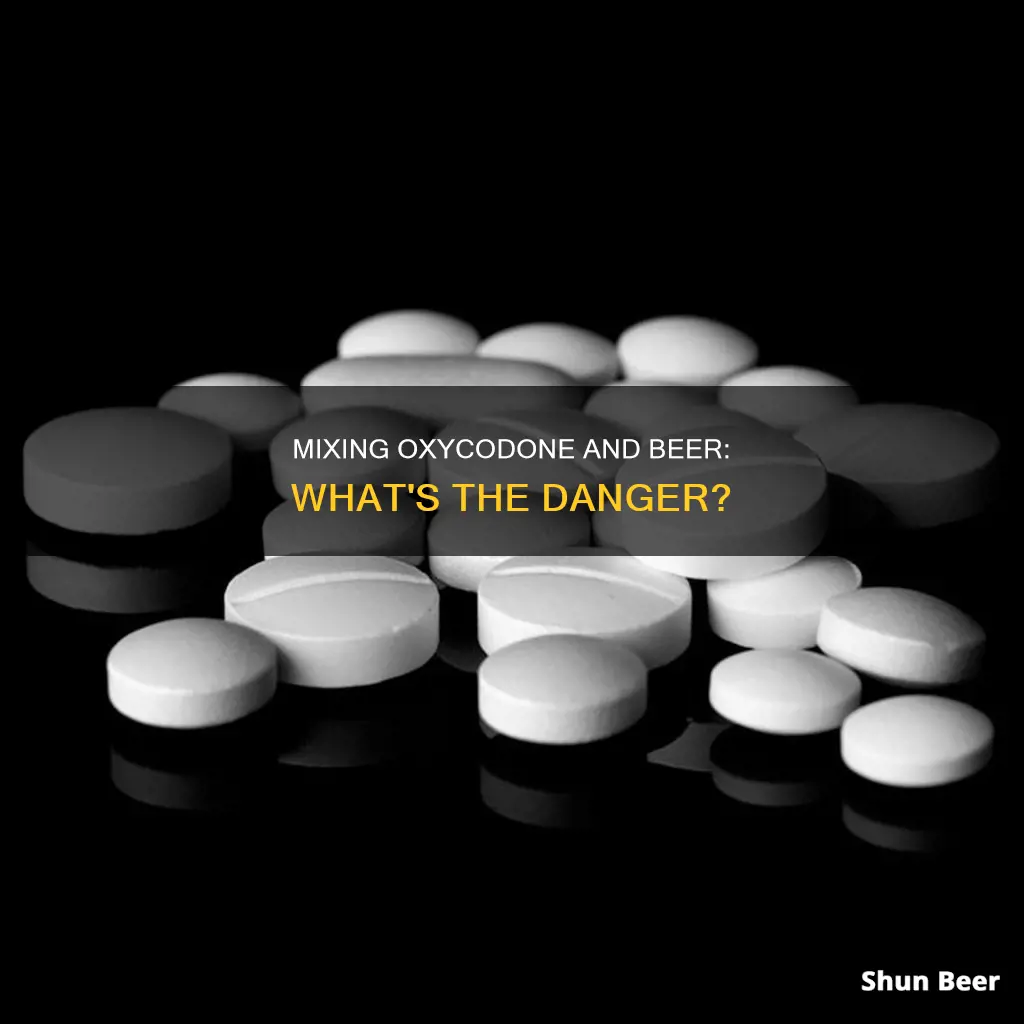
Oxycodone is a highly addictive opioid, often referred to by its brand name, OxyContin, and is used to relieve severe pain. It is illegal to use or possess oxycodone without a prescription. When taken with alcohol, the results can be very dangerous and even fatal. Both substances are central nervous system depressants, slowing down a person's heart rate and breathing. Mixing the two can lead to respiratory depression, a condition characterised by minimal or no breathing, which can quickly cause brain damage and death.
| Characteristics | Values |
|---|---|
| Mixing oxycodone and alcohol | Dangerous and potentially lethal |
| Why it is dangerous | Both are central nervous system depressants that slow down a person's breathing |
| Oxycodone | Opioid, highly addictive, used for pain relief |
| Alcohol | Consumed for its mood-altering effects |
| Mixing the two | Can slow or stop breathing and heart function, leading to brain damage and death |
| Treatment for addiction | Detoxification, inpatient rehab, outpatient rehab, behavioural therapy, medications |
What You'll Learn
- Oxycodone and alcohol are central nervous system depressants
- Mixing oxycodone and alcohol can cause slowed or stopped breathing
- Mixing oxycodone and alcohol can cause slowed or stopped heart function
- Mixing oxycodone and alcohol can lead to brain damage
- Mixing oxycodone and alcohol can cause organ damage

Oxycodone and alcohol are central nervous system depressants
Alcohol is a central nervous system depressant as it slows down basic functions such as speech, reactions, and movement. It also affects brain function and neural activity, impairing the ability to think clearly, altering perceptions of one's immediate surroundings, and distorting issues of judgment.
Oxycodone is an opioid, a chemical substance that pharmaceutical companies use to manufacture medications for pain relief and anesthesia. Oxycodone interacts with opioid receptors in the brain and blocks the transmission of pain signals in the nervous system. It also causes sedation and euphoria by unleashing a surge of dopamine, a neurotransmitter that reinforces behavior.
Combining alcohol with oxycodone is highly dangerous. Both substances slow down a person's breathing and heart rate. When the body attempts to withstand the effects of both substances, the respiratory system may be overwhelmed, causing respiratory depression, a condition characterized by minimal or no breathing at all. This is a form of suffocation that can quickly cause brain damage and death. The combination of alcohol and oxycodone also endangers the heart, as they are both depressants that slow down a person's heart rate. Mixing the two may therefore shock the cardiovascular system and cause a heart attack or a stroke.
Understanding Three-Burner Brewing: An Efficient Beer System
You may want to see also

Mixing oxycodone and alcohol can cause slowed or stopped breathing
Oxycodone is a powerful opioid pain medication often prescribed for moderate to severe pain. It is a Schedule II drug, which means it has a high potential for abuse and dependence. Mixing oxycodone and alcohol can lead to slowed or stopped breathing, which can be fatal.
Oxycodone works by binding to opioid receptors in the brain and spinal cord, altering how the brain perceives pain. It can also cause sensations of pleasure or euphoria, making it highly addictive. Oxycodone can slow down breathing and, when taken in high doses, can lead to death.
Alcohol is a central nervous system depressant that slows down brain activity. Drinking alcohol can lead to impaired judgment, slowed reflexes, and slowed breathing.
When oxycodone and alcohol are combined, the effects of both drugs are increased. This can lead to severe respiratory depression, which is characterized by minimal breathing or no breathing at all. This condition can quickly cause brain damage and death if left untreated. The combination of alcohol and oxycodone also slows down heart rate and can lead to heart failure.
According to the National Institute on Drug Abuse (NIDA), chronic abuse of oxycodone can lead to liver damage, kidney failure, and respiratory problems. When alcohol is added, these risks are significantly increased. Long-term effects of mixing oxycodone and alcohol can include gastrointestinal problems, cardiovascular problems, neurological problems, and an increased risk of cancer.
Mixing oxycodone and alcohol is extremely dangerous and can have life-threatening consequences. It is important to seek medical help immediately if you or someone you know is experiencing an overdose from mixing these substances.
Drinking Beer in Your Front Yard: Legal or Not?
You may want to see also

Mixing oxycodone and alcohol can cause slowed or stopped heart function
Oxycodone and alcohol are both central nervous system depressants. When taken together, they can have a synergistic effect, with the impact of both drugs being greater than when they are used separately. This means that the combination can lead to a slowing or even stopping of the heart and breathing, which can be fatal.
Oxycodone is a prescription opioid, often used to manage moderate to severe pain. It is highly addictive and interacts with opioid receptors in the brain, blocking the transmission of pain signals in the nervous system. It also causes sedation and euphoria by releasing a surge of dopamine.
Alcohol is not used for medicinal purposes. It is consumed primarily for its mood-altering effects. It works through the central nervous system and slows down the functioning of various parts of the brain. When consumed in excess, alcohol can overwhelm the body and lead to respiratory failure, coma, or even death.
Combining these two substances can have unpredictable and deadly results. Both oxycodone and alcohol slow down a person's heart rate and breathing. This means that mixing the two can shock the cardiovascular system and cause a heart attack or stroke. The combination also increases the risk of respiratory depression, a condition characterised by minimal or no breathing. This can quickly lead to brain damage and death if left untreated.
The dangers of mixing oxycodone and alcohol are so significant that even drinking a moderate amount of alcohol with taking just one oxycodone pill can lead to respiratory depression. The elderly are particularly vulnerable to the fatal effects of this combination.
Beer Towers: How Do They Work?
You may want to see also

Mixing oxycodone and alcohol can lead to brain damage
Oxycodone is a medication used to treat moderate to severe pain. It is an opioid that numbs pain signals from the central nervous system (CNS) and the brain. Oxycodone is highly potent and can lead to physical and psychological dependence. It is sold under brand names such as OxyContin, Percocet, and Roxicodone.
Alcohol, on the other hand, is a central nervous system depressant that slows down brain activity and inhibits the release of certain neurotransmitters. When consumed, alcohol can lead to impaired judgment, decreased inhibitions, and a loss of coordination.
When oxycodone and alcohol are mixed, they create a deadly combination that can have severe consequences. Both substances are central nervous system depressants and have synergistic effects, making them more potent when used together. This combination can lead to:
- Respiratory depression: Mixing oxycodone and alcohol can cause slowed breathing or even cessation of breathing, which can quickly lead to brain damage and death if left untreated. This is a form of suffocation, as the body is deprived of oxygen.
- Cardiovascular issues: Both substances can cause a decrease in heart rate and lower blood pressure, which can lead to cardiac arrest, heart failure, and death.
- Extreme drowsiness and sedation: The combination can result in impaired cognitive function, coordination, and reaction time, increasing the risk of accidents, falls, and injuries.
- Increased risk of overdose: Mixing oxycodone and alcohol enhances each other's effects, making it easier to reach dangerous levels of intoxication.
- Liver damage: As both substances are metabolized by the liver, excessive consumption can lead to liver damage or even liver failure.
The combination of oxycodone and alcohol is unpredictable and potentially fatal, affecting the central nervous system, respiratory system, cardiovascular system, and cognitive function. It is crucial to avoid mixing these substances and seek professional help if struggling with addiction or abuse.
Beer Mail: Shipping Alcohol Straight to Your Doorstep
You may want to see also

Mixing oxycodone and alcohol can cause organ damage
Mixing oxycodone and alcohol can have severe consequences on the body. Both substances are central nervous system depressants, which means they slow down breathing and cardiac function. This can lead to breathing difficulties, shallow breathing, or even respiratory failure, resulting in a life-threatening situation. The combination of these two substances also impacts the cardiovascular system, causing a decrease in heart rate, which may lead to cardiac arrest.
The potential health risks and complications of mixing oxycodone and alcohol are not limited to the respiratory and cardiovascular systems. This combination can result in extreme drowsiness and sedation, impairing cognitive function, coordination, and reaction time. It also increases the risk of accidents, falls, and injuries.
Furthermore, mixing oxycodone and alcohol significantly increases the risk of overdosing. Both substances enhance each other's effects, making it easier to reach dangerous levels of intoxication. This can lead to fatal results.
The long-term consequences of mixing oxycodone and alcohol can also include severe liver damage or even liver failure. Both substances are metabolized by the liver, and excessive consumption can overwhelm its ability to function properly. This can have lasting impacts on overall health and well-being.
Additionally, long-term cognitive impairment is a significant concern when mixing these substances. The combination can impair memory, attention, and overall cognitive function, impacting an individual's ability to perform daily tasks and maintain a high quality of life.
In conclusion, the combination of oxycodone and alcohol is a deadly mixture that should be avoided. The effects on the central nervous system, respiratory system, cardiovascular system, and cognitive function are extremely dangerous and can be fatal. It is crucial to prioritize health and well-being by refraining from the simultaneous use of these substances.
Beer and Vicodin: A Risky Mix?
You may want to see also
Frequently asked questions
No, it is not safe to mix alcohol and oxycodone. Both substances are central nervous system depressants, which slow down breathing and heart rate. Mixing the two can lead to respiratory depression and even death.
The combination of oxycodone and alcohol can cause slowed or stopped breathing, a decreased heart rate and blood pressure, unconsciousness, coma, and death. Mixing these substances can also lead to irreversible brain and organ damage.
If you or someone you know is mixing oxycodone and alcohol, it is important to seek professional help immediately. Addiction to either substance can be treated through detoxification, inpatient rehab, outpatient rehab, behavioural therapy, and support groups.







